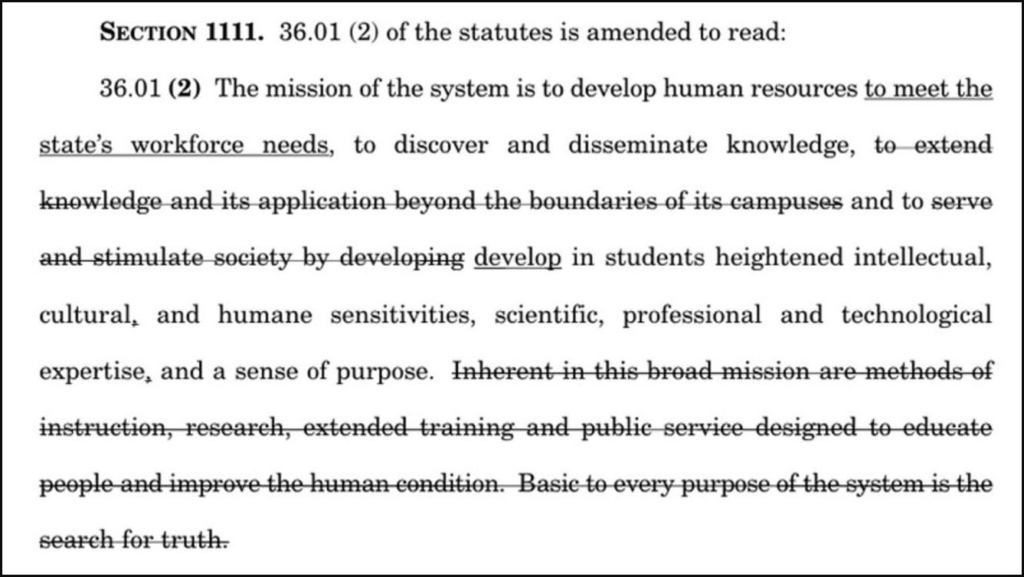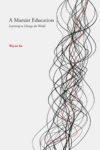About a month ago I happened to find out that an old friend, a graduate student in philosophy at the University of Wisconsin-Madison, was also in Memphis — each of us attending different philosophy conferences that were proceeding in beautiful ignorance of one another. We met up on Beale Street of all places, which was fitting because the culture of Beale Street is really what is at issue here (more on this later). I asked him how things were going, and being of a sunny California disposition he said generally they were going quite well. However, when I asked him about “all the Walker stuff,” he said that it was definitely a distraction. “You wake up each morning wondering what crazy shit he is going to do next.”
This took place in March, about a month after Governor Scott Walker ended up in hot water for trying to change the wording of the University of Wisconsin mission statement — swapping out references to public service and the “search for truth” for “meet the state’s workforce needs.” Through a spokeswoman he attempted to downplay the issue, attributing it to a “drafting error,” and quickly amended the deletions (though kept in the references to job preparation).

There are emails that clearly show the deletion was intentional on the part of his administration, but there needn’t be a gotcha moment when the change in priorities has been occurring in plain sight. My friend mentioned that, with the budget cuts, what seemed to be happening was that vacancies were simply not being filled. This was confirmed recently when Chancellor Rebecca Blank announced that 400 positions would be terminated over the next two years, the majority of which were to come in the College of Letters and Science, which teaches nearly 60% of credit hours at UW-Madison (a higher percentage if you just focus on introductory — i.e., breadth — courses taken in the first two years of college).
The University of Wisconsin-Madison was founded in 1848, but became a land grant institution four years after the passage of the Morill Act of 1862. The act, named after Vermont Senator Justin Morill, devoted money derived through the sale of land “to the endowment, support, and maintenance of at least one college where the leading object shall be, without excluding other scientific and classical studies and including military tactics, to teach such branches of learning as are related to agriculture and the mechanic arts . . . in order to promote the liberal and practical education of the industrial classes in the several pursuits and professions in life.”
The balance between “scientific and classical studies” (read College of Letters and Science) and “agriculture and the mechanic arts” has been an uneasy one since the founding of Madison. The Morill Act was quickly followed by the foundation of The Grange (1867), a federal agency advocating for the interests of rural farmers that quickly became radicalized, in the service of progressive politics, in the hands of state and local chapters. Thus when UW-Madison hadn’t graduated one student from its agricultural program by 1880, it came under tremendous pressure from newly organized farmers to make good on its promise to “promote the liberal and practical education of the industrial classes in the several pursuits and professions in life.” The problem, in their eyes, was that professors and presidents were infatuated with the German model of the research university, which may have been good for elitist Germanophile professors, but provided no tangible benefit to local constituencies.
As the American higher education system expanded, especially with the many land grant colleges that were created in the two Morill Acts (1862 and 1890), the desire for universities to intervene in matters of practical economic life grew. Moreover, the very growth of many universities was tied to the expansion of industrial capitalism in the post-Reconstruction era, as attested to by the make-up of many boards of trustees at the time (titans of all the major industries). The challenge posed by Populists (such as members of The Grange) concerned the influence that these private entities should have on university governance and faculty politics. The worry of the Populists was that in the absence of a strong ideal, universities would function in support of capitalists as opposed to helping farmers, laborers, and others who wanted universities to further democratic ends, for example favoring access to the elitism of professors. The Wisconsin Idea was to step into this breach, and as then UW President Charles Van Hise put it, “I shall never be content until the beneficent influence of the University reaches every home in the state.” By combining the academic search for truth with public service the legitimation crisis of the early university system was largely solved.
Two figures serve as a hinge between this initial discontent and the “Wisconsin Idea,” which current University of Wisconsin president Ray Cross says is “embedded in our DNA,” and which is seen to be the target of Walker’s “drafting error.” The first is Richard T. Ely, an erstwhile philosopher who changed course and took up the emerging discipline of political economy after studying with leading figures on an 1877 visit to Germany. What Ely and his cohort picked up in Germany was a new approach to scholarship, one which privileged knowledge production and commentary on social issues. Ely interpreted this spirit as showing that research, the disinterested search for truth, was not elitist, but could in fact very useful for rural Wisconsonites. Upon his return to the United States he would write influential textbooks that challenged the uncritical acceptance of British laissez-faire economics and applied novel methods of analysis to American issues such as labor unions, inequality, government intervention, and collective ownership. (His book titles include The Labor Movement in America (1886), Monopolies and Trusts (1900), Property and Contract in Relation to the Distribution of Wealth (1914), and Land Economics (1940).) He also trained a generation of engaged academics, including Edward Bemis, who was dismissed from the University of Chicago for his views on the collective ownership of utilities. For Bemis and Ely, the exercise of their academic office meant using one’s knowledge, research methods, and authority to confront the realities of industrial capitalism and other issues of social and economic planning.
The second figure is the aforementioned Charles Van Hise, University of Wisconsin president in the first decades of the 20th century. Van Hise suggested that universities could be linked with the state government in an advisory role. Professors would generate facts through research (especially in economics, law, and the burgeoning social sciences), policy would be based on these facts (an idea Walker clearly has little interest in), and a laboratory for social policy experimentation would be born. This arrangement was quite successful. For example, in 1911 Wisconsin developed the first workers compensation program in the US as a result of this collaboration. Van Hise also set up extension schools and summer programs to address the charge from Populists that the university had no interest in admitting rural and working youths. As stated above, he was adamant that the benefits of university research and teaching be felt in every home, and set up the programs and policies to make this a reality. This is the “Wisconsin Idea” that many have felt is either under threat or irredeemably compromised.
Why is this little deviation into history important? Walker’s inclusion of “meet the state’s workforce needs” is a dangerous misreading of what it means for universities to provide a public benefit. For Ely and Van Hise the systematic inquiry into social realities, pursued under the cultural conditions that may be unique to the modern research university, was not value neutral. They were trying to establish public legitimacy for the university in a time of massive political and economic concentration (Charles McCarthy’s 1912 book The Wisconsin Idea explicitly touts the university’s ability to buck the trend of monopolization in industry and influence). Unlike Walker, unless we count surviving a recall vote as a sign of approval, this progressive interpretation of social benefit has a long track record of, well, actually providing social benefits, garnering widespread support from and reaching the lives of countless Wisconsonites. (To get an idea of this on the national level, see the “Discoveries That Alter Our Lives” chapter of Jonathan Cole’s The Great American University.) Austerity can claim no such record, and, moreover, if its logic were teased out, is unlikely to do so. Van Hise and Ely wanted to meet the “workforce needs” of the state, but they also wanted workers to have some power in shaping how those workplaces might operate (hence the focus on trusts, labor organizing, and applying modern social science to the stale laissez-faire theories that allowed monopolies to develop in the first place).
That voters and legislators are not seeing Walker’s priorities as advocating for a form of modern servitude, to the benighted class that gets to decide the “workforce needs” to which graduates must submit, is a major problem. There is a breaking point for institutions, and it’s easy to see the Wisconsin Idea entering the final stages of a death spiral. There isn’t the language to make sense of it these days, where a crippling risk-aversion in politics and management is actually allowing some very radical changes to occur at the university level, obscuring our focus from the value judgments that are inevitably at play when austerity, or the supposedly cold logic of budgetary necessity is invoked. And there is no Grange to pose the legitimation crisis in terms that reflect the interests of working citizens.
What does all this have to do with Beale Street? Like the Wisconsin Idea, Beale Street has an important history, one that many would say is part of the DNA of Memphis. And like a university system that strips out classes in the arts, non-applied sciences, and humanities, and aggressively genuflects to the needs of the market, it is neither an attractive nor fun place to be for very long — you go there to hear “music” or “the blues,” in forms just as empty and bereft of interesting qualities as classes preparing you for “jobs.” In both cases we’re meant to restrict our judgment, or the free play of our critical and creative faculties, and just accept the reality placed before us as being valuable in some way.
Scott Walker was recently in my home state of New Hampshire, bragging about the $1 sweater he bought at Kohl’s. Again, why would judgment come into play here, not just about the economics of this purchase (Kohl’s is under investigation in three states for their pricing practices), but about the aesthetics of a country where we clothe ourselves in monotone fabrics snatched out of the discount bin at our local superstore? It’s the same, easy, dumb, “everyman” approach to fashion that he is asking his universities to take in allocating their dwindling resources.
On Beale Street you see what it means to strip judgment out of a culture. It is the disposition of tourists, who as Nietzsche reminds us, “climb mountains like animals, stupid and sweating; one has forgotten to tell them that there are beautiful views on the way up.”
Michael Schapira is the Interviews Editor for Full Stop.
This post may contain affiliate links.







